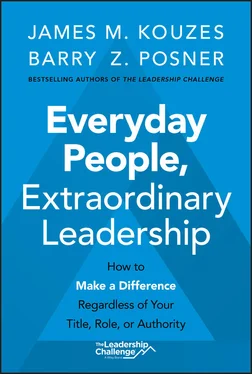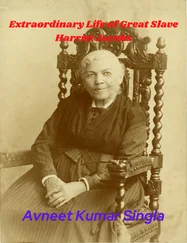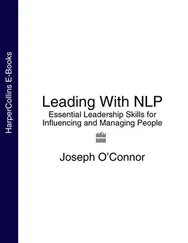So let's get something straight right from the start. Leadership is not a hierarchical level. It is not a title or a rank. It is not a position of power or a place of privilege. When you look up the word leadership in the dictionary it does not start with an uppercase L . It starts with a lowercase l , and lead, leader , and leadership literally derive from the word meaning “to go” or “to guide.” That's what leadership is all about: going places and guiding others.
From whom do people seek this kind of guidance and direction? We decided to find out.
Leadership Is a Relationship
In a global study involving over 35,000 people, we asked them to think about the individuals in their lives who were their role models for leadership. 3 We provided a number of categories from which their leadership role model might come. Take a look at the list in Table 1.1. From which category is the one person whom you would choose as your leadership role model?
Whom did you select? When thinking back over their lives and selecting their most important leadership role models, respondents overwhelmingly nominated a family member more often than anyone else. Next most important were a teacher or coach and an immediate supervisor. Those under 25 years of age (Gen Z) had these ranked second and third, while Millennials (Gen Y and Gen X; ages 25 to 55) and Boomers (56 and older) had them ranked in the reverse order. For those in the workplace, their teachers and coaches are their immediate supervisors. Another 6 percent indicated a co-worker or colleague. Altogether these four categories accounted for more than three-quarters of all responses. Eight percent indicated “none/not sure,” which meant that only 16 percent of all responses were in the categories of business leader, community leader, political leader, religious leader, actor or entertainer, and professional athlete. This pattern is relatively stable across genders, ethnic groups, educational levels, industries, professions, and even hierarchical levels.
TABLE 1.1 Leadership Role Models
| Actor or Entertainer |
| Business Leader |
| Coach |
| Community Leader |
| Co-Worker/Colleagues |
| Family Members |
| Immediate Supervisor |
| Religious Leader |
| Political Leader |
| Professional Athlete |
| Teacher |
| None/Not sure |
The data clearly shows that the people selected are individuals respondents are closest to. They are not the people in the news, on TV, or in social media. They're the ones with whom people have had the most frequent contact. In other words, leadership role models are local . While famous folks may occupy the headlines, those with whom you have more personal contact are most likely to become your role models and have more influence over how you lead and how you develop as a leader. And make no mistake about it, the same realization applies to you. You very well could be the leadership role model for those closest to you—more than could someone on that so-called list of the world's best leaders.
These results have extremely important implications. Parents, teachers, and coaches are the individuals who are setting the leadership example for young people. It's not hip-hop artists, movie stars, professional athletes, or others making news on social media who inspire them about leadership. And if you are a parent, a teacher, or volunteer coach, you are the one they are most likely going to look to for the example of how a leader responds to competitive situations, handles crises, deals with loss, or resolves ethical dilemmas. It's not someone else. It's you .
The findings also reveal that if you're in a work organization, you are more likely to find role models among your colleagues on your immediate team than at the pinnacle of the organization or somewhere on the outside. If you are now a supervisor or manager, you may already be someone's role model. You are more likely than any other person in the organization to influence their desire to stay or leave, the trajectory of their careers, their ethical behavior, their ability to perform at their best, their drive to wow customers, and their motivation to share and serve the organization's vision and values.
There's no escape. To some, you are or could be their role model for leading. Those individuals could be colleagues on your team, they could be peers in another part of your workplace, they could be kids on the youth athletic team or club you coach after work, they could be people from your community who are working with you as a volunteer, or it could be your son or daughter, spouse or partner, at home.
A question for you to consider: If you are potentially a role model for someone, wouldn't you want to be the best role model you can be? It's your choice. Just be aware that regardless of title or position, be it at home, in school, the community, or workplace, you must take responsibility for the quality of leadership the people around you observe and receive. You are accountable to yourself and others for the leadership you demonstrate.
The individuals selected most frequently as leadership role models—family members, teachers, coaches, immediate supervisors, and co-workers—also make evident the most important finding of all. They underscore the truth that leadership is a relationship . Leadership is a relationship between those who aspire to lead and those who choose to follow. This is true regardless of whether the relationship is one-to-one or one-to-many. If you are going to be a leader whose guidance others want to follow willingly, there must be a human connection, something that binds you and others together. It's the quality of this relationship that will determine over the long term whether others will follow your lead or not. To lead effectively, you have to appreciate the underlying dynamics of the leader-constituent relationship. It's extremely important to understand, therefore, the qualities that people look for in the leaders they would willingly follow. If people are going to want to follow you over the course of a project or the course of a career, what do they most want to see in your behavior?
A relationship between people characterized by fear and distrust will never produce anything of lasting value. A relationship characterized by mutual respect and confidence will overcome the greatest adversities and leave a legacy of significance. Any discussion of leadership must attend to the dynamics of this relationship. Strategies, tactics, skills, and techniques are empty without an understanding of the essential human aspirations that connect people with their leaders and leaders with their people.
Credibility Is the Foundation of Leadership
What sort of person would you listen to, take advice from, be influenced by, and willingly follow, not because you have to, but because you want to? What does it take for you to be the kind of person that others want to follow, doing so enthusiastically and voluntarily? Understanding and responding to these expectations is essential to the exercise of exemplary leadership.
To understand this leader-constituent relationship we have routinely been conducting surveys over the past 40 years about the personal values, traits, and characteristics that people indicate are most important to them in an individual they would willingly follow. A key word in this sentence is “willingly.” It is one thing to follow someone because you think you have to “or else,” and it's another when you follow an individual because you want to.
We've gathered responses from more than 120,000 respondents, and they have been striking in their consistency over the years. 4 Our evidence shows that people must pass several essential character tests before they earn the designation of leader from other people, as demonstrated by the data presented in Table 1.2.
Читать дальше












